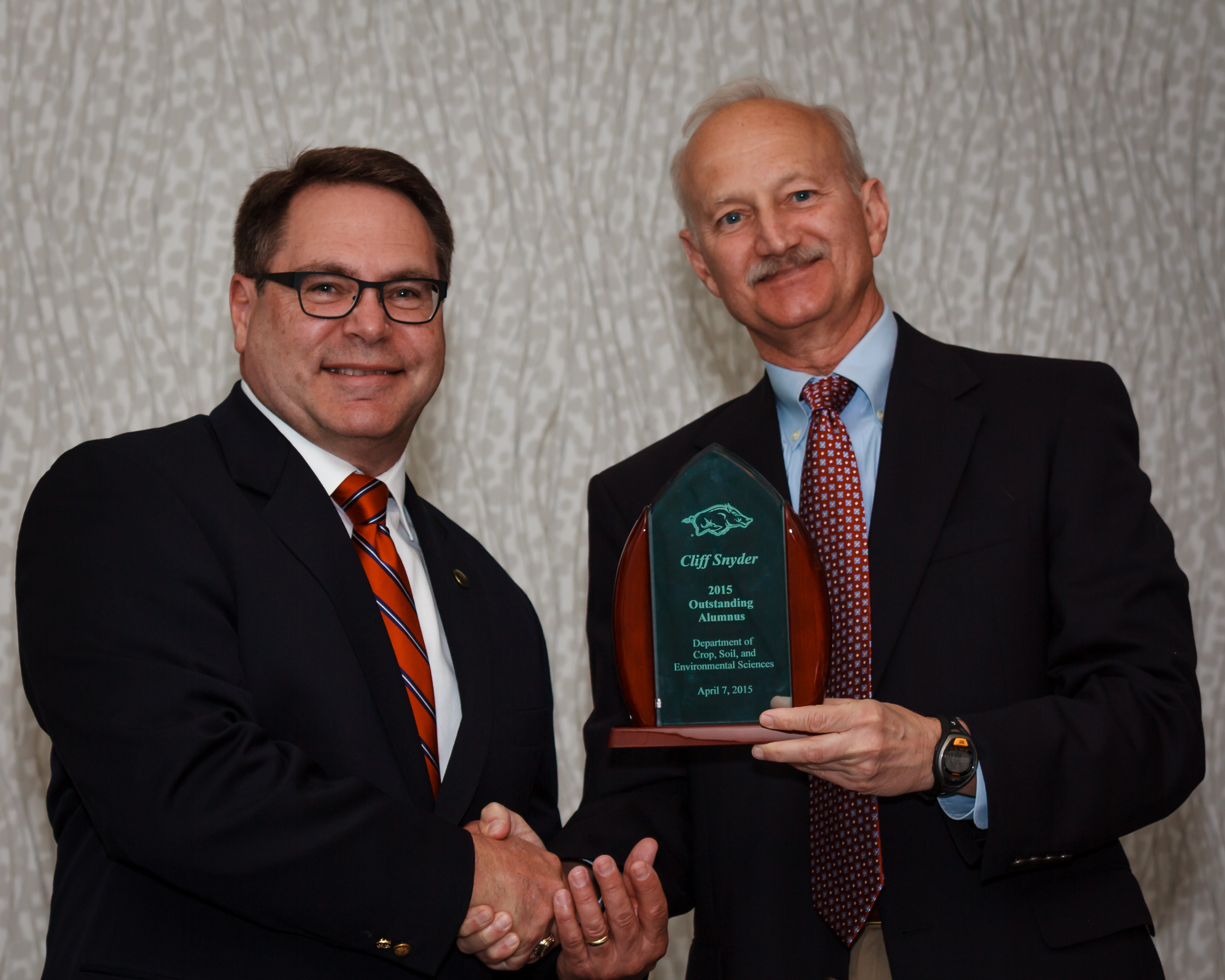IPNI's Snyder Named Outstanding Alumnus of Crop, Soil and Environmental Sciences

Cliff Snyder (left) of the International Plant Nutrition Institute is presented the Crop, Soil and Environmental Sciences 2015 Outstanding Alumnus award by department head Robert Bacon.
FAYETTEVILLE, Ark. – Cliff Snyder, the nitrogen program director in Conway for the International Plant Nutrition Institute, has been named the 2015 Outstanding Alumnus of the Crop, Soil, and Environmental Sciences Department in the University of Arkansas' Dale Bumpers College of Agricultural, Food and Life Sciences.
Snyder earned his bachelor's degree in agriculture in 1978 and his master's degree in agronomy in 1980, both from the U of A. He went on to earn his doctorate in soil science and forestry from North Carolina State University in 1984.
Snyder's responsibilities at the Atlanta-based Institute include coordinating efforts to deal with environmental issues related to nitrogen fertilizer use in agriculture across the country and internationally.
"We are very proud to honor Cliff as our outstanding alumnus," said department head Robert Bacon. "He is the consummate professional and has risen to prominence as seen by his service on national and international panels. We are fortunate and thankful Cliff has remained active in the state as well as with our department."
Snyder was a state soils specialist with the U of A Cooperative Extension Service from 1984 to 1995, and regional director with the Potash & Phosphate Institute from 1995 to 2006 before moving to his current position in 2007. With the Potash & Phosphate Institute, he supervised agronomic research and education programs in 11 southeastern states.
Snyder was appointed to the U.S. Environmental Protection Agency Science Advisory Board Hypoxia Advisory Panel in August 2006 and was involved in producing a 2008 report titled "Hypoxia in the Northern Gulf of Mexico." In March 2008, he was appointed to the U.S. EPA Farm, Ranch and Rural Communities Advisory Committee. He is also an invited contributor to and reviewer of reports and scientific panels on greenhouse gas emissions from cropland agriculture within the U.S. Department of Agriculture and the EPA. Snyder has provided scientific and technical advice on greenhouse gas emissions, water quality, soil organic carbon, and nutrient management to the Field to Market Sustainability Alliance and other organizations. He is a member of the Science Advisory Committee of the International Nitrogen Initiative, and an invited member of the United Nations Environment Program Steering Committee addressing global nitrous oxide emissions.
He was elected Fellow in the Soil Science Society of America in 2009 and the American Society of Agronomy in 2002. In 2012, he received the Soil Science Industry and Professional Leadership award from the SSSA.
About the Dale Bumpers College of Agricultural, Food and Life Sciences: Bumpers College provides life-changing opportunities to position and prepare graduates who will be leaders in the businesses associated with foods, family, the environment, agriculture, sustainability and human quality of life; and who will be first-choice candidates of employers looking for leaders, innovators, policy makers and entrepreneurs. The college is named for Dale Bumpers, former Arkansas governor and longtime U.S. senator who made the state prominent in national and international agriculture.
About the University of Arkansas: The University of Arkansas provides an internationally competitive education for undergraduate and graduate students in more than 200 academic programs. The university contributes new knowledge, economic development, basic and applied research, and creative activity while also providing service to academic and professional disciplines. The Carnegie Foundation classifies the University of Arkansas among only 2 percent of universities in America that have the highest level of research activity. U.S. News & World Report ranks the University of Arkansas among its top American public research universities. Founded in 1871, the University of Arkansas comprises 10 colleges and schools and maintains a low student-to-faculty ratio that promotes personal attention and close mentoring.
Contacts
Robby Edwards, director of communications
Dale Bumpers College of Agricultural, Food and Life Sciences
479-575-4625,
robbye@uark.edu